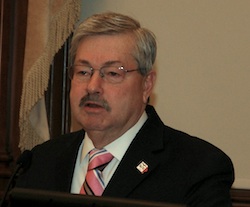Hundreds of people from the Midwest turned out to submit comments today to the Environmental Protection Agency (EPA) at the “Hearing in the Heartland: Supporting the Renewable Fuel Standard” hosted by Iowa Governor Terry Branstad and Lt. Governor Kim Reynolds.
The EPA held only one public hearing in Washington, D.C. last year in response to their 2014 Renewable Fuel Standard – a proposed policy that lowers the use of biofuels; rather  than increases the use of biofuels as intended by the policy. Branstad noted that when he was testifying in DC with the Iowa delegation, they met with EPA Administrator Gina McCarthy and requested a public hearing in the Midwest and were denied.
than increases the use of biofuels as intended by the policy. Branstad noted that when he was testifying in DC with the Iowa delegation, they met with EPA Administrator Gina McCarthy and requested a public hearing in the Midwest and were denied.
Not to be deterred, Branstad rallied several other Midwestern Secretaries of Agriculture to hold their own hearing and people from throughout the Midwest including Iowa, Illinois, Indiana, Minnesota, Nebraska and South Dakota traveled on one of the coldest days of the new year to tell their stories of the benefits of biofuels.
“I’ve been a relentless supporter of biofuels dating back to the 1970s, when we called it “gasahol,” said Gov. Branstad to the audience. “It’s truly incredible to see how the industry has grown and provided diverse benefits to agriculture and created thousands of quality jobs across America.”
“With a state that has over 92,000 farmers, dozens of thriving international agri-business companies, and a large variety of bio-science leaders, it’s easy to see that the growth is a result of the hard work and innovation of our farmers and the technology advancements in the use of corn, soybeans and other biomass products.”
Branstad noted the many benefits of biofuels including: diversifying our nation’s energy portfolio and reducing our dependence on foreign oil; reducing air pollution; giving consumers choices at the pump; and helping grow family incomes in rural America. He stressed that EPA’s proposal on the RFS would have devastating effects on this growth ad on job creation and he, along with many other bi-partisan Midwest leaders have voiced opposition.
You can listen to Iowa Governor Terry Branstad’s full remarks here:Obama, EPA Needs to Listen to MidwesternersRead More










